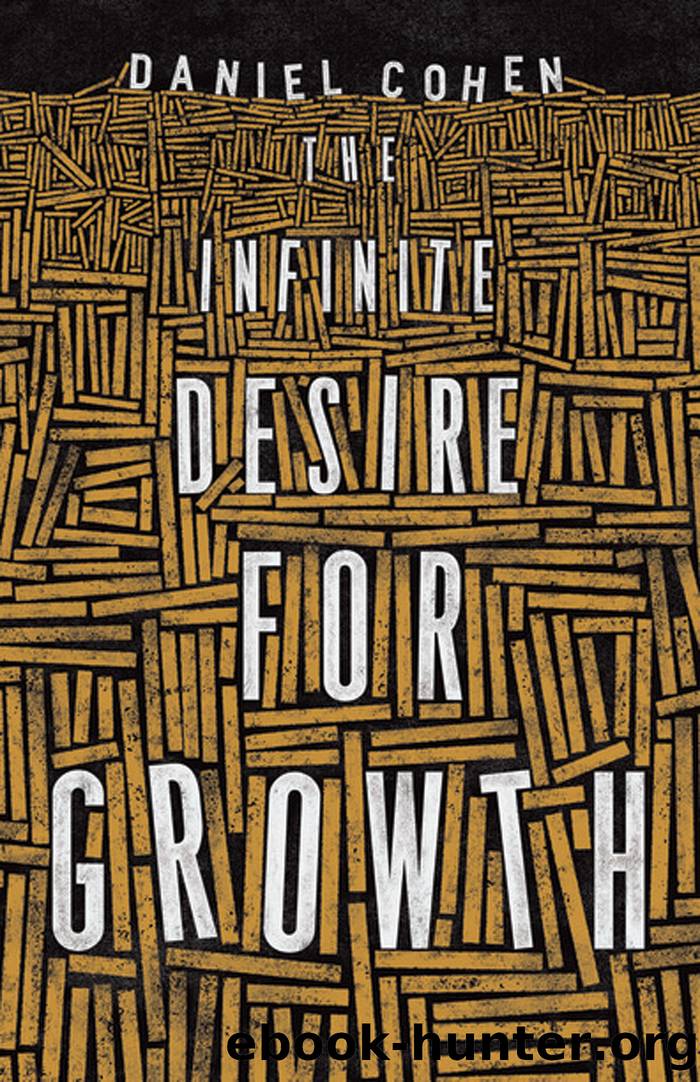The Infinite Desire for Growth by Daniel Cohen

Author:Daniel Cohen [Cohen, Daniel]
Language: eng
Format: epub
ISBN: 9781400889495
Published: 2018-08-14T16:00:00+00:00
CHAPTER 10
Marx in Hollywood
Gordonâs pessimism follows in the great tradition of the classical economists, from Malthus to John Stuart Mill to Karl Marx, who announced the coming of a âstationary state,â where growth would come to an end. Marx did not accept the Malthusian demographic explanations of poverty, but he did adopt their main conclusions: âWhatever the level of wages,â he concludes, âthe workerâs condition must deteriorate with the accumulation of capital.â For Marx, poverty is a social rather than a biological phenomenon. Machines are among the instruments that capitalists have at their disposal to keep wage earners in poverty. The leading classical economist David Ricardo added a chapter to his Principles of Political Economy and Taxation (1817), to show the ambiguous effect machines have on the remuneration of the labor force.
Fear of machines dates back a long time. Emperor Diocletian is said to have banned a machine that raised columns because he did not want to âdeprive the people of their bread.â Much later, in 1811, the Luddites, a group of English textile workers, would smash the new power looms to protest against the threat the machines represented to their livelihood.1 These are merely two instances of many. In the second half of the twentieth century, economists sought to appease such fears. Led by the great growth theorist Robert Solow, they argued that machines make workers more productive and thus allow them to benefit from the fruits of growth. Between the years 1945 and 1975, unemployment was at its lowest even as mechanization reached a peak, a circumstance which illustrates the potential benefits of machines: by raising workersâ productivity, machines enabled their wages to rise as well.
The arguments of growth theorists rest therefore on the crucial hypothesis that machines âcomplementâ labor. It is said that one good complements another if, like water and tea leaves, they are both necessary for the final product (tea). Conversely, they are substitutable if, like tea and coffee, a choice is made of one over the other. The question today, however, is less whether âmachines replace workersâ than specifically which tasks they replace, and which survive.
The economist David Autor emphasizes the uncertainty of this situation as follows: according to one survey, 63 percent of economists claim that âautomationâ is not responsible for unemployment, but 43 percent agree that the new information and communication technologies are responsible for the stagnation of wages in the United States (30 percent are undecided). As Brynjolfsson and McAfee also say, economists hide (from themselves) a âdirty little secretâ: there is nothing to guarantee that everyone will benefit from technological progress.
Download
This site does not store any files on its server. We only index and link to content provided by other sites. Please contact the content providers to delete copyright contents if any and email us, we'll remove relevant links or contents immediately.
Time Management Made Easy: How to Cultivate New Habits, Improve Productivity and Get Things Done by Joshua Strachan(2417)
The 7 Habits of Highly Effective People by Stephen R. Covey & Sean Covey(2267)
The Concise Laws of Human Nature by Robert Greene(1913)
Doesn't Hurt to Ask by Trey Gowdy(1637)
Primal Leadership by Daniel Goleman(1283)
Hook Point: How to Stand Out in a 3-Second World by Brendan Kane(1245)
Don't Sweat the Small Stuff...and It's All Small Stuff by Richard Carlson(1121)
HBR's 10 Must Reads 2021 by unknow(1096)
The Power of 100! by Shaun King(1096)
Amazon Unbound by Brad Stone(1045)
100 Things Successful People Do by Nigel Cumberland(1029)
Master of One by Jordan Raynor(1008)
HBR's 10 Must Reads 2021 by Harvard Business Review(1007)
The Job Closer by Steve Dalton(993)
Lives of the Stoics by Ryan Holiday & Stephen Hanselman(969)
Declutter Your Mind: A step by step guide to learn to control your thoughts, stop worrying, relieve anxiety and eliminate panic attacks and negative thinking by Mia Chandler(968)
Conflicted by Ian Leslie(872)
The Book of Hope by Jane Goodall(872)
Coders at Work: Reflections on the craft of programming by Peter Seibel(847)
